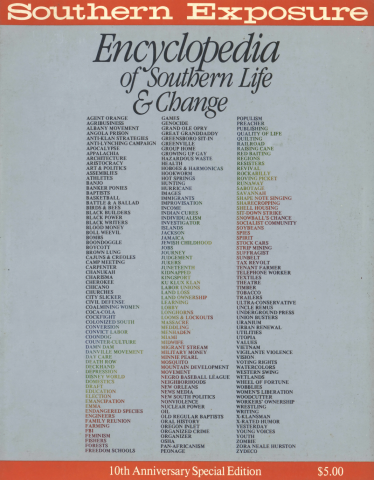
This article originally appeared in Southern Exposure Vol. 11 No. 3, "10th Anniversary." Find more from that issue here.
DELCO, NC — I was born in Shackletown, in eastern North Carolina, where you either chipped boxes, collected turpentine and sold it, or you perished. My father and all the children that were old enough worked hard collecting turpentine, but even so I remember at least one time when we would have perished anyway if the good Lord hadn't worked what then seemed like a miracle.
Back in those days — the first decade of this century — there was no bridge across the creek leading to Whitt Wells's grocery store and turpentine still. So when a freshet came (a sudden overflow of the stream after a heavy rain), it made an island out of Shackletown. This particular time it even washed away the footlog, and none dared trying to cross the creek to Whitt's store. It was winter, and meal barrels were being scraped and soup was running thin in the kitchens of all 12 Shackletown families.
I believe that was the first and only morning our family ever got up without a mouthful to eat. The older children understood, but I didn't. Mama had chipped up collard stalks the day before and used the last of the meal making dumplings. Now it was the afternoon of the next day and I was singing the news; my stomach must have thought my throat was cut.
Right back of our house was the "Eely Hole," which had been serving us with fish like a smokehouse to those who had meat. I'd seen Mama sit on a bank and fill a basket with red fin pikes and war mouth perch. So I got to pulling her arm, begging her to go and catch me a fish. Hungry as the other children were, they laughed at the idea of catching anything during this freshet. My brother Dempsey came back from checking on the creek and reported, "The creek is running cold and hard and it has the swamp flooded."
But I wouldn't take no for an answer. Finally Mama said: "For heavens sake, Dempsey, dig two or three worms and we'll go show Sam (my nickname) that we can't even get to the run of the creek."
And oh, for the faith of a little child! I felt like I was going to eat. All hands bundled up tight against the cold. Dempsey led the way and Mama came next with a short fishing pole; further back came my three sisters. When we came to the sharp decline where the path led down to the flat swamp, we saw the water was down some but was still too high for us to get to the run.
But to please me, Mama baited her hook and swung it towards midstream, where she let it lie on the bottom. We all watched but no fish were biting.
Presently Dempsey said: "Mama, look at that pike!" And there one was, about 10 inches long, fat as a mole. None of us knew it then, but it's the nature of a pike to come out and "lie up" in still water during a freshet.
Mama eased the hook over to the pike's mouth, even touched its jaw, but he didn't bite. Dempsey said, "Mama, take the worm off and ease the hook under his jaw, and jerk."
Mama did so, and when she jerked she slung that pike to the top of the hill where he fell free of the hook. He hit the path flouncing and was coming down it end over end. My sisters started screaming and getting out of the way, but I knelt in the path and let him strike me — then grabbed him like a fish hawk!
Up the bank I ran, holding my fish and hollering for my sister Carrie to come to the house and cook him for me.
Carrie scaled and gutted my pike. We were out of grease and salt, so Carrie coiled him like a hoop in a wide fry pan and set it on a bed of hot coals in the clay-daubed chimney fireplace. The skin got to sticking and when she turned him, pieces of bright flesh stuck to the pan. When she got him about half-cooked, she set the pan on the table. I went to work like a hungry cat. No salt, no grease, no bread, but that fish filled me up.
I walked to the door then and saw Dempsey coming up the hill with a forked stick strung on both sides with fat pike. Just then I saw our mule and cart rounding the bend, and here came Papa and my brother Willie with meal, flour, lard and a box of smoked herrings. They had gotten across the creek. The "panic" was over, at least for a while.
A few years later, tobacco replaced turpentine as the main money crop. And now the paper companies have bought a large part of the land hereabouts; the shortleaf pines they've planted have curbed the growth of the longleaf pines we used to harvest turpentine from. Shackletown is now called "Prosper," and most people work at the paper mill. The old pioneer settlers have mostly passed on, and few remember the hard times we used to have back in the Shackletown days.
Tags
Joseph Hufham
Joseph Hufham is a freelance writer in Delco, NC. (1983)

